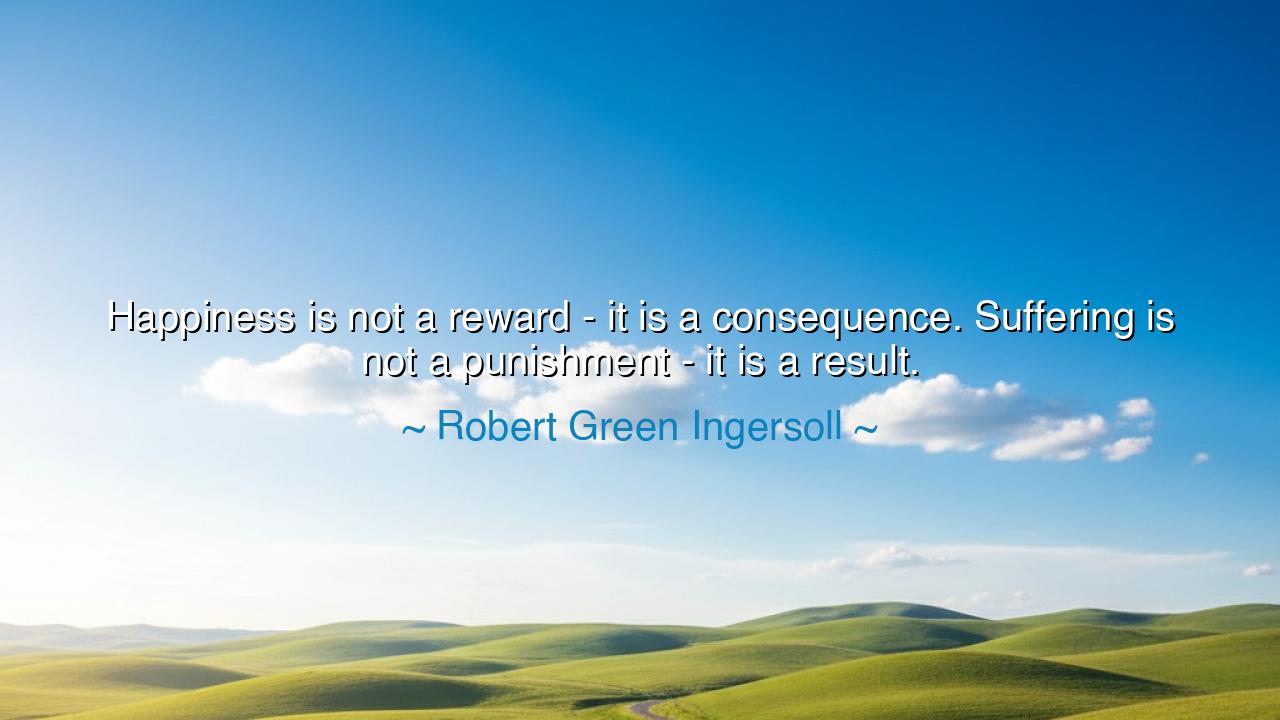
Happiness is not a reward - it is a consequence. Suffering is not
Happiness is not a reward - it is a consequence. Suffering is not a punishment - it is a result.






“Happiness is not a reward — it is a consequence. Suffering is not a punishment — it is a result.” Thus spoke Robert Green Ingersoll, the “Great Agnostic,” a thinker whose words were as sharp as they were compassionate. In this brief but profound teaching, he reveals the true law that governs the inner life — that happiness and suffering are not dispensed by fate, nor are they gifts or curses from some unseen power. They arise from the natural order of existence, from the very choices, thoughts, and actions that shape our being. To seek happiness as a prize or to fear suffering as divine vengeance is to misunderstand life’s great harmony. Ingersoll, standing at the crossroads of reason and morality, calls us to maturity — to take responsibility for our own souls.
The origin of this wisdom lies in Ingersoll’s vision of moral independence. Living in the 19th century, he challenged the belief that joy and pain were the instruments of a judging God. Instead, he saw the universe as governed by cause and effect, both in the physical and the moral realm. Just as a seed grows according to the soil it is planted in, so too does happiness spring from the soil of our actions, and suffering from the poisons we sow. In his time, many saw punishment and reward as divine decrees, but Ingersoll saw them as natural consequences — the unfolding of law, not the whim of power.
To understand this, one must see that happiness is not bestowed — it is earned through harmony with truth, love, and virtue. When a person lives with honesty, compassion, and courage, they align themselves with the current of life itself. Their joy is not given from above, but rises from within, like sunlight emerging from the dawn. So too, when one acts with cruelty, deceit, or indifference, the soul suffers not because it is condemned, but because it is out of tune with the music of existence. Ingersoll teaches that suffering is not sent to us as punishment; it is the echo of our own disharmony, the result of actions misaligned with wisdom.
History offers countless mirrors for this truth. Consider the life of Socrates, who faced his death not with despair, but with serenity. His happiness was not the reward of the world, for the world condemned him — it was the consequence of a life lived in pursuit of truth. When he drank the hemlock, his peace did not come from favor or mercy, but from the knowledge that he had lived justly. In contrast, consider the tyrants of history — men like Nero, who surrounded himself with pleasure yet lived in torment, fearful of shadows, consumed by paranoia. Their suffering was not divine punishment; it was the natural result of a corrupted spirit, the inevitable harvest of cruelty.
Ingersoll’s insight carries the wisdom of the ancients, though it wears the language of reason. The Stoics spoke of the same law when they taught that virtue is happiness, and that to live in accordance with nature is to find peace. Epictetus, born a slave, knew that freedom lies not in circumstance but in one’s own thoughts and actions. If one acts with integrity, no misfortune can enslave the soul; if one acts in folly, no wealth can bring peace. Thus, happiness and suffering are the reflections of our inner state — not the rewards or punishments of an outer judge, but the truth our lives themselves reveal.
This teaching, however, does not deny compassion. Ingersoll would remind us that not all suffering arises from our choices — that life, in its complexity, sometimes wounds the innocent. But even then, the law remains: how we respond to pain determines whether it becomes destruction or wisdom. The one who meets sorrow with patience and empathy transforms suffering into strength; the one who meets it with bitterness multiplies their own despair. We cannot always choose what life gives us, but we can always choose how we live within it — and that choice determines whether we live in harmony or in conflict with ourselves.
Therefore, my children, take this wisdom into your heart: seek not happiness as a distant reward, nor fear suffering as a divine curse. Understand that every thought, every act, every moment shapes the soul’s destiny. Live truthfully, love generously, and think clearly, and joy will follow you like your shadow. Act in hatred, greed, or deceit, and sorrow will cling to you as your own creation. This is not judgment — it is justice, woven into the very fabric of being.
And so, as Robert Green Ingersoll teaches, the wise do not beg the heavens for happiness, nor curse them for pain. They plant goodness and reap peace; they sow understanding and harvest light. Walk, then, in awareness of the law that governs both heart and world: that happiness and suffering are not gifts, but consequences — the reflection of how faithfully we live in harmony with truth. For he who masters this law will find not only joy, but freedom — the freedom to shape his own destiny, and to live each day as the creator of his own peace.






AAdministratorAdministrator
Welcome, honored guests. Please leave a comment, we will respond soon